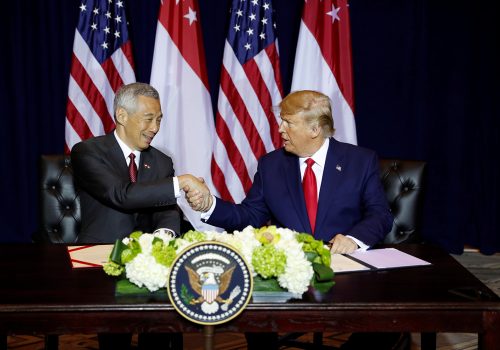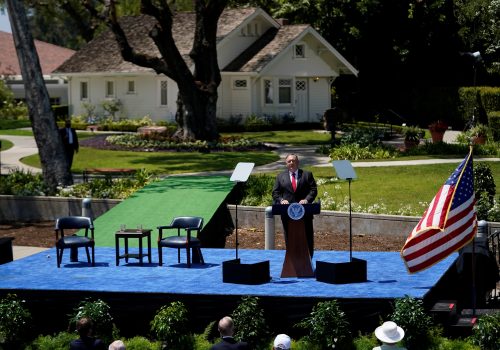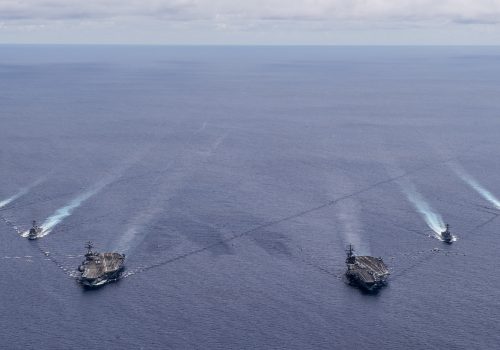What we’re forgetting about the Cold War

Who’s nostalgic for the Cold War?
Not me. I can remember crouching under my desk at Goldwood Elementary School in northern Ohio during duck-and-cover drills.
Yet there seems to be a lot of enthusiasm for a rerun, this time with China. The media is full of talk about the dawn of a “New Cold War.” Many people think we’re already in it. Gone are worries about the high probability of war when an upstart power spooks a reigning rival—the so-called “Thucydides trap.” That was so last year.
During my time in the US intelligence community, I heard many senior intel types talk about how much easier it was during the Cold War. You knew the enemy. You didn’t have to face a plethora of terrorist groups and networks, and struggle to discern what type of relationship each had with al-Qaeda. Whereas the War on Terror was composed of a thousand shades of gray, the Cold War had been helpfully black and white.
But as President Donald Trump and former Vice President Joe Biden each accuse the other of going soft on China, we have forgotten the tense moments, close calls, and widespread suffering of that first Cold War and somehow grown fond of it instead.
For those who need a refresher: The term “Cold War” was popularized by Bernard Baruch, an adviser to Harry Truman, in a 1947 speech to the South Carolina legislature. Waged across four decades, from the end of the Second World War until the fall of the Berlin Wall and Soviet Union, the Cold War split countries and divided maps, with many nations falling under communist rule and others subjected to US military interventions. The Soviet Union sent troops to preserve communism in East Germany (1953), Hungary (1956), Czechoslovakia (1968), and Afghanistan (1979). The United States overthrew a left-wing government in Guatemala (1954), supported an unsuccessful invasion of Cuba (1961), invaded the Dominican Republic (1965) and Grenada (1982), and launched a failed, decade-long war in Vietnam that tore American society apart.
Then there were the tense moments when war seemed likely. During the Cuban Missile Crisis, one of the Atlantic Council’s founders, Dean Acheson, advocated air strikes to take out Soviet missile sites on the island, discounting the possibility of retaliation. We know now that then-Soviet Premier Nikita Khrushchev authorized (leading up to the US blockade) the Soviet commander in Cuba to use his tactical nuclear warheads against invading US troops if an attack were underway and he could not reach Moscow to confirm permission. Other Soviet documents showed that sixty nuclear warheads for medium-and intermediate-range missiles had already arrived in Cuba prior to the blockade in addition to ninety-eight tactical nuclear warheads.
President John F. Kennedy wisely opted for a blockade of Cuba instead of an invasion or air strikes. The Soviets removed the missiles in return for Kennedy promising to not invade Cuba and the president’s brother, Robert, giving private assurances to Soviet Ambassador Anatoly Dobrynin that US missiles in Turkey would be dismantled. Such a delicate diplomatic minuet would be difficult if not impossible to reenact in today’s supercharged, social media-driven, leaderless, and leaky world.
So why the Cold War nostalgia? In part because what people remember about the period are the decades after the Cuban Missile Crisis and Vietnam War: Richard Nixon and Henry Kissinger opening up to communist China; the initiation of US-Soviet détente in the early 1970s and the cooling of tensions between the superpower rivals; the eventual collapse of the Soviet Union, as George Kennan predicted decades before. Because of that victory, we may all assume that the West would prevail again in a contest with China.
That assumption, however, may very well be misguided.
By any measure, the Chinese “threat” to the United States and the West is quite different than the Soviet one. From the very start of the Bolshevik Revolution, Russian communists waged an ideological war with the West, which eagerly reciprocated. Today’s Chinese leaders only mouth Marxism while practicing state capitalism, and the United States has benefitted enormously from interdependence with China. American economic and intellectual ties with the Soviets, even after the 1975 Helsinki Process inaugurated greater exchanges, were tiny by comparison with, say, the 369,000 Chinese students who came to the United States prior to the COVID-19 pandemic. China is a key driver of the world’s economy while the Soviets were completely cut off (largely by their own choice) from global trade. China’s increasing military budget is still a fraction of the US military budget, whereas military goals and spending dominated the Soviet economy. And though we in the US have differences with China, they are not comparable to the worries we had about a Soviet invasion of Western Europe and nuclear annihilation.
We got a glimpse of what the forced decoupling of the US-China relationship would look like with the Trump administration’s tariff hikes, which were intended to help US manufacturing but instead resulted in fewer jobs in the sector, and triggered retaliatory tariffs that increased producer costs. Most US companies don’t want to move lock, stock, and barrel out of China—a likely occurrence in a cold war—and thus deny themselves market share in a booming market and leave themselves no choice but to raise prices for US consumers. Onshoring—repatriating business operations—is a popular concept, but this era of robotics and artificial intelligence will probably accelerate the replacement of humans with machines, not the reverse. And who is to say that America’s allies will follow Washington’s lead—a big, untested assumption in Secretary of State Mike Pompeo’s recent speech on the coming confrontation with China. COVID-19 has certainly exposed the limited appeal of American soft power, but even before the pandemic Europeans were planning to stake out “strategic autonomy” and Asian allies were overly reliant on trade and investment with China. Is middle America, moreover, ready for another jolt to living standards there because the United States wants to isolate China?
Science tells us that the human brain needs mental frameworks for cognition. But we need to be careful about which frameworks we use. The domino theory of the 1950s and 1960s led to the Vietnam War, arguably the worst military disaster in US history. A supposed Cold War with China may cause us to believe we are engaged in a titanic struggle with an enemy to whom we need not show any compassion, instead of encouraging us to find ways to lower tensions and identify areas of cooperation. Is that what we want?
Mathew J. Burrows is the director of the Atlantic Council’s Foresight, Strategy, and Risks Initiative in the Scowcroft Center for Strategy and Security. Follow him on Twitter @matburrows.


